| Srl | Item |
| 1 |
ID:
173775
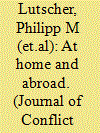

|
|
|
|
|
| Summary/Abstract |
In this article, we study the political use of denial-of-service (DoS) attacks, a particular form of cyberattack that disables web services by flooding them with high levels of data traffic. We argue that websites in nondemocratic regimes should be especially prone to this type of attack, particularly around political focal points such as elections. This is due to two mechanisms: governments employ DoS attacks to censor regime-threatening information, while at the same time, activists use DoS attacks as a tool to publicly undermine the government’s authority. We analyze these mechanisms by relying on measurements of DoS attacks based on large-scale Internet traffic data. Our results show that in authoritarian countries, elections indeed increase the number of DoS attacks. However, these attacks do not seem to be directed primarily against the country itself but rather against other states that serve as hosts for news websites from this country.
|
|
|
|
|
|
|
|
|
|
|
|
|
|
|
|
| 2 |
ID:
186764
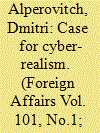

|
|
|
| 3 |
ID:
123051
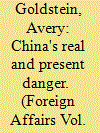

|
|
|
|
|
| Publication |
2013.
|
| Summary/Abstract |
Much of the debate about China's rise in recent years has focused on the potential dangers China could pose as an eventual peer competitor to the United States bent on challenging the existing international order. But another issue is far more pressing. For at least the next decade, while China remains relatively weak compared to the United States, there is a real danger that Beijing and Washington will find themselves in a crisis that could quickly escalate to military conflict. Unlike a long-term great-power strategic rivalry that might or might not develop down the road, the danger of a crisis involving the two nuclear-armed countries is a tangible, near-term concern -- and the events of the past few years suggest the risk might be increasing.
|
|
|
|
|
|
|
|
|
|
|
|
|
|
|
|
| 4 |
ID:
131289
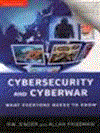

|
|
|
|
|
| Publication |
New Delhi, Oxford University Press, 2014.
|
| Description |
viii, 306p.Pbk
|
| Standard Number |
9780199451654
|
|
|
|
|
|
|
|
|
|
|
|
Copies: C:1/I:1,R:0,Q:0
Circulation
| Accession# | Call# | Current Location | Status | Policy | Location | IssuedTo | DueOn |
| 057761 | 005.8/SIN 057761 | Main | Issued | General | | RA73 | 12-Apr-2024 |
|
|
|
|
| 5 |
ID:
146737
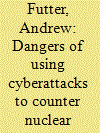

|
|
|
|
|
| Contents |
Top military and defense officials in the United States are currently contemplating plans to use cyberattack capabilities against enemy missile and command-and-control systems as part of a new push for full-spectrum missle defense.
|
|
|
|
|
|
|
|
|
|
|
|
|
|
|
|
| 6 |
ID:
188292


|
|
|
|
|
| Summary/Abstract |
Some discussions of cyberattacks paint them broadly as low cost and widely available, failing to distinguish cyberattacks by difficulty. However, as the literature has long recognized, cyberattacks are not all alike. The most sophisticated attacks require greater capabilities, including noncyber capabilities, that are commanded by only by a handful of states. Assessment of the difficulty of cyberattacks therefore requires a broader view of a cyberattack than a view focused on gaining and maintaining unauthorized access to a computer. The proposed Cyber Effects model of a cyberattack looks to the ultimate effect sought by the attacker, which may be focused only on gaining access to a device or may seek access to produce a cascade of external effects. This model can then be used as a conceptual model to organize factors that bear on attack difficulty for assessment.
|
|
|
|
|
|
|
|
|
|
|
|
|
|
|
|
| 7 |
ID:
149503
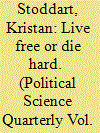

|
|
|
|
|
| Summary/Abstract |
KRISTAN STODDART describes the cybersecurity policies of the United States and the United Kingdom. He argues that both countries should address cyberattacks to critical national infrastructure by adopting internationally-oriented policies that include the private sector and civil society.
|
|
|
|
|
|
|
|
|
|
|
|
|
|
|
|
| 8 |
ID:
102410
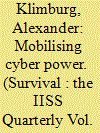

|
|
|
|
|
| Publication |
2011.
|
| Summary/Abstract |
Cyber crime, cyber terrorism and cyber warfare share a common technological basis, tools, logistics and operational methods. They can also share the same social networks and have comparable goals. The differences between these categories of cyber activity are often razor thin, or only in the eye of the beholder. From the perspective of a cyber warrior, cyber crime can offer the technical basis (software tools and logistic support) and cyber terrorism the social basis (personal networks and motivation)with which to execute attacks on the computer networks of enemy groups or nations.
|
|
|
|
|
|
|
|
|
|
|
|
|
|
|
|
| 9 |
ID:
102863
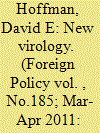

|
|
|
| 10 |
ID:
107390
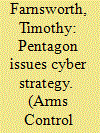

|
|
|
|
|
| Publication |
2011.
|
| Summary/Abstract |
In the wake of a rising number of cyberattacks on computer networks worldwide, the U.S. Department of Defense on July 14 released an unclassified strategy for defending against and responding to attacks on U.S. computer networks and infrastructure.
|
|
|
|
|
|
|
|
|
|
|
|
|
|
|
|
| 11 |
ID:
162659
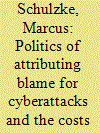

|
|
|
|
|
| Summary/Abstract |
Attribution is one of the most serious challenges associated with cyberattacks. It is often difficult to determine who launched an attack and why, which hinders efforts to formulate appropriate responses. Although the attribution problem has been discussed extensively in research on cybersecurity, it is generally approached as a technical challenge for security professionals and politicians. I contend that it is vital to take the attribution problem beyond this elite focus by considering how attributional challenges can interfere with the public’s efforts to understand security challenges and evaluate government actions. Faced with uncertainty and the confusion of attempting to understand novel cyber threats, citizens frequently lack the information they need to reliably identify the culprits behind attacks—or sometimes even to know whether an attack has taken place. I show that attributional uncertainty immediately following cyberattacks encourages dependence on a narrow range of elite frames and the assignment of blame to familiar enemies. Over time this promotes conspiratorial thinking and poses a risk to democratic accountability. When seen in light of these broader costs, the attribution problem becomes a vital political concern with implications that reach beyond the scope of elite-focused cybersecurity research.
|
|
|
|
|
|
|
|
|
|
|
|
|
|
|
|
| 12 |
ID:
147490


|
|
|
|
|
| Summary/Abstract |
What factors drive politically motivated cyberattacks? Our research focuses on one particular kind of cyberattack: politically motivated, distributed denial-of-service attacks (DDoS). We argue that denial-of-service attacks are a particular form of a larger category of political contention that is more similar to nonviolent than violent activism. We offer a country-level explanation that helps establish why some nation-states are more likely to suffer such attacks while most others are not. When we control for wealth and Internet penetration, the strongest factor explaining why a country is more likely to suffer DDoS attacks is the dangerous combination of repression and a highly educated population. The results have important implications both for the scholarly study of this form of contention, as well as for policymakers grappling with this new form of activism.
|
|
|
|
|
|
|
|
|
|
|
|
|
|
|
|
| 13 |
ID:
100544
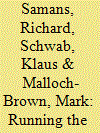

|
|
|
| 14 |
ID:
112451
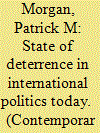

|
|
|
|
|
| Publication |
2012.
|
| Summary/Abstract |
In comparison with the Cold War era, deterrence in international politics has changed significantly, even though many of the basic components of that deterrence still exist and continue to have an impact. Deterrence is now less salient in national security policies and international security management, more recessed, particularly nuclear deterrence. This is primarily due to the huge changes in international politics ushered in by the end of the Cold War, particularly in great-power political relationships, and which are continuing to unfold. Important developments are underway with respect to nuclear deterrence, extended deterrence, collective actor deterrence, and other aspects of international system security. While many old topics pertaining to deterrence continue to be studied and generate continuing controversies, often along the same lines as in the past, some important investigations and theoretical analyses have also emerged on pivotal deterrence, the deterrence of cyberattacks, terrorism, and international crime. What is needed most is analysis on how to develop and apply deterrence strategy and practice in new ways as a central contribution to global and regional system security maintenance and management, a function deterrence performed during the Cold War but in ways now largely out of date. Also needed is careful attention to the possibility of the return of more traditional international politics, particularly if this were to occur in relations among the major states, and careful consideration of how best to use deterrence to hedge against such a development.
|
|
|
|
|
|
|
|
|
|
|
|
|
|
|
|
| 15 |
ID:
119010
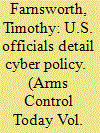

|
|
|
| 16 |
ID:
115774
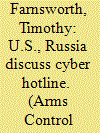

|
|
|
| 17 |
ID:
186762


|
|
|